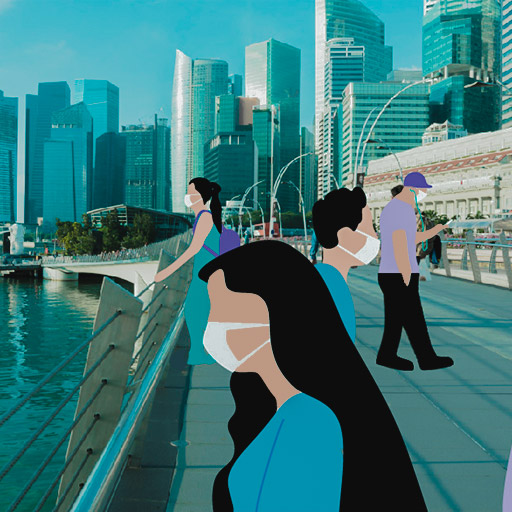While we’re not out of the woods in this COVID-19 crisis, we are already beginning to ask ourselves: What will life be like in the wake of the coronavirus? There’s much talk about a “new normal” and how we will need to do things differently, knowing how contagious the disease is.
But what’s heartening is that some are already talking about how society can emerge stronger after this crisis. This was the theme of Deputy Prime Minister Heng Swee Keat’s recent speech, and the discussion reveals two truths about us as humans.
One, we are survivors: no matter what kicks us down, we will pick ourselves up, dust ourselves off, and tell ourselves that nothing can defeat us, and we will arise stronger than before. Two, crisis can build a person, nation, and society, just as gold is purified by fire.
Is this true of us as Christians too? Is it true of the church as a whole? Can we emerge stronger in our faith and in our journey as followers of Christ in the wake of COVID-19?
The answer, I believe, is a resounding yes. Why? Because . . .
1. We Discover What (and Who) Really Matters
In many ways, COVID-19 has stripped us bare.
The massive impact of the tiny coronavirus has made us discover how vulnerable we are to disease and the randomness of life, where no amount of wealth and wisdom can save us. The restrictions we have had to implement have deprived us of many pillars in our daily lives and even our Christian walk. We’ve been reminded that work isn’t about the office, family isn’t about going out and doing things, and faith isn’t about church services.
The changes have compelled us to question and re-discover what lies at the heart of all these important elements of our lives. And this means our future walk with God will have an even more solid foundation, built on principles that last.
For example, we’ve found that family togetherness is about “being” as much as “doing”, that we can build closeness simply by spending time together (without necessarily having to go for a meal, a holiday, or shopping). And we’ve found that building up our faith means going back to the always-important basics of praying, reading God’s Word, spending time with God, and caring for each other in creative ways.
Above all, we’ve discovered that life can be so uncertain and unstable, and that the only certainty we have is God.
Amid our fears of being infected, the only person we could turn to for protection is God. In our worries about job loss and the recession, the only security we have is in God. In the anxiety caused by work-from-home and home-based-schooling disruptions, the only person who could give us true comfort and assurance is God. In our hopes that things will be fine again, we can only look to God.
Psalm 91:9–16 expresses this complete trust we have in God, our only true refuge:
If you say, ‘The Lord is my refuge,’
and you make the Most High your dwelling,
no harm will overtake you,
no disaster will come near your tent.
For he will command his angels concerning you
to guard you in all your ways;
they will lift you up in their hands,
so that you will not strike your foot against a stone.
You will tread on the lion and the cobra;
you will trample the great lion and the serpent.
‘Because he loves me,’ says the Lord, ‘I will rescue him;
I will protect him, for he acknowledges my name.
He will call on me, and I will answer him;
I will be with him in trouble,
I will deliver him and honour him.
With long life I will satisfy him
and show him my salvation.’
2. We Learn from Failure
In the battle against COVID-19, we’ve made many missteps. Global, national, and church leaders have made mistakes and poor decisions. And while this has understandably caused much frustration and drawn criticism, I find it heartening whenever leaders and authorities acknowledge that they have got it wrong and made the necessary U-turns.
And that’s what will make us stronger: we will not be defeated nor demoralised by things that have gone wrong.
The Bible is not a story of perfection and spotless records; if anything, it is a record full of flaws and failures. Most of its heroes and giants of faith were absolute zeroes at some point. As one Bible teacher has put it so well, the Hall of Faith in Hebrews 11 is really a Hall of Redeemed Failures.
Jesus showed His willingness to forgive and restore His followers at every opportunity. After Peter betrayed Him—arguably one of the worst things a follower can do—the risen Lord ministered to Peter’s heart and commitment (John 21:15–17). Jesus isn’t interested in what we did wrong; all He cares about is: Will we still love Him? Will we continue to accept His call to serve Him?
COVID-19 has made many of us realise how we’ve neglected our family, our friends, our fellow believers, and the needy and forgotten in society. It’s made us see how weak our faith was, or how misplaced our priorities have been. But let’s not beat ourselves up over where we went wrong. We can move forward, knowing that God has forgiven us completely, and will help us restore relationships and refresh our walk with Him.
Cleanse me with hyssop, and I shall be clean;
wash me, and I shall be whiter than snow.
Let me hear joy and gladness;
let the bones you have crushed rejoice.
Hide your face from my sins
and blot out all my iniquity.
Create in me a pure heart, O God,
and renew a steadfast spirit within me.
Do not cast me from your presence
or take your Holy Spirit from me.
Restore to me the joy of your salvation
and grant me a willing spirit, to sustain me.
(Psalm 51:7–12)
3. We Look Out for Each Other
If there’s one practical thing that COVID-19 has taught us about relationships, it is that we need to look out for others. As the pandemic uncovered the plight of those affected directly or indirectly, it has shown us whom we need to care for.
We’ve seen that the “needy” includes more than the obvious poor and underprivileged. There were many who were left on the wrong side of the digital divide, and therefore unable to use technology to order food, stay in touch with loved ones, continue their studies, and get financial help. There were lonely elderly folks who were neglected by family members. There were thousands of foreign workers who had little access to the usual comforts and security that many of us enjoy.
At the same time, it’s been so heartening to see many Singaporeans rising to the occasion. Some helped elderly neighbours to stock up on groceries. Some volunteered to deliver supplies to foreign workers. Some contacted lonely and needy people regularly to check if they were okay. Many donated to causes to help the less-privileged. In big ways and small, we learnt to see who our neighbours were, and to love them.
Having discovered who our neighbours were and learnt to love them in new ways, I believe that we will continue doing this when the COVID-19 crisis finally ends. And I believe this will make us stronger as a society and as a church, for we will be carrying out Christ’s commandment to love and reflecting His glory:
A new command I give you: love one another. As I have loved you, so you must love one another. By this everyone will know that you are my disciples, if you love one another.
(John 13:34–35)


